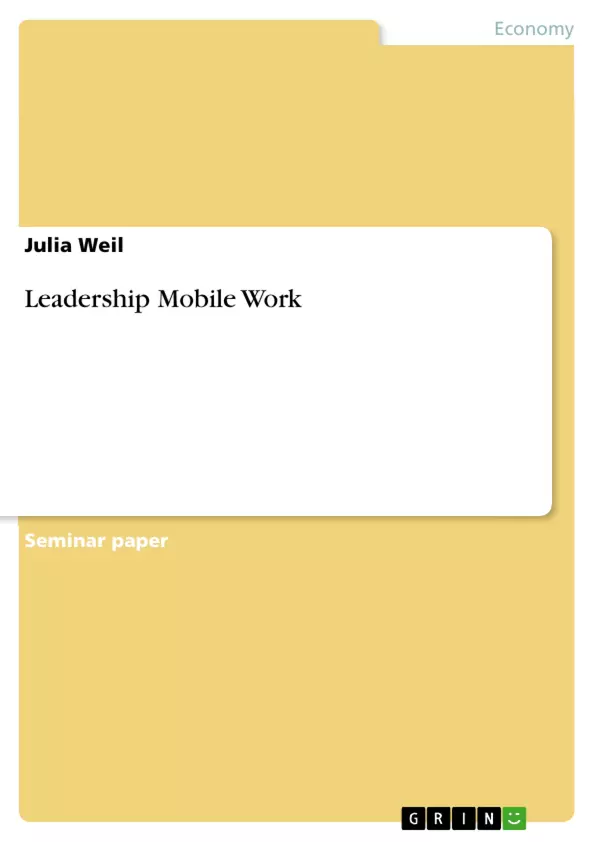The central issue of this written assignment is the change of personnel management in times of working from home. In the course of this, the term home office as well as the umbrella term of mobile work are going to be defined. A further focus of this paper is placed on the advantages and disadvantages which are connected with this form of work as well as on the impact they have on professional everyday life.
In the course of this work, the changes lying ahead of executives having to lead employees who are mainly working from home are going to be elucidated. In doing so, the individual roles which an executive has to assume henceforth are going to be defined. Furthermore, the importance of motivation as well as the influence of social contacts on the tasks are going to be illustrated. Additionally, for executives, the issue of trust is of crucial importance, which, as part of this work, is going to be explained as well. Finally, the already mentioned aspects are going to be summarised and evaluated in the conclusion.
Inhaltsverzeichnis (Table of Contents)
- Introduction
- Problem Formulation
- Objective of the Paper
- Theoretical Principles
- Definition of the Terms Mobile Work and Home-Office
- Advantages and Disadvantages of Working from Home
- The Change of Leadership in Times of Working from Home
- Confidence
- Motivation of Employees
- Social Relations
- Conclusion
Zielsetzung und Themenschwerpunkte (Objectives and Key Themes)
This paper examines the evolving role of leadership in the context of increasing remote work practices, particularly focusing on the shift to home-office environments. It seeks to define mobile work and home-office, analyze the advantages and disadvantages of remote work, and explore the implications for leadership styles in this new landscape.
- The impact of digitization and demographic change on the work environment.
- The definition and various forms of mobile work, including telework and mobile telework.
- The advantages and disadvantages of working from home.
- The necessary adaptation of leadership behaviors for managing remote teams.
- The importance of employee motivation, social relations, and trust in remote work settings.
Zusammenfassung der Kapitel (Chapter Summaries)
- Introduction: Introduces the topic of digitization and its implications for the workplace, specifically highlighting the rising trend of mobile work and the challenges it presents for traditional leadership styles. The introduction also sets the stage for examining the evolving work environment in light of demographic changes and the impact of the COVID-19 pandemic.
- Theoretical Principles: Provides a comprehensive definition of mobile work and its various forms, including telework and mobile telework. This chapter analyzes the advantages and disadvantages of working from home, examining the factors that influence the effectiveness of remote work arrangements.
- The Change of Leadership in Times of Working from Home: Explores the necessary adjustments to leadership styles in a remote work environment. This chapter delves into the importance of building trust, fostering employee motivation, and navigating the dynamics of social relations in a virtual context.
Schlüsselwörter (Keywords)
The core concepts and themes explored in this paper include mobile work, home-office, leadership, remote management, trust, employee motivation, social relations, digitization, and demographic change.
Frequently Asked Questions
What is the difference between Home-Office and Mobile Work?
Home-Office specifically refers to working from one's own residence, while Mobile Work is an umbrella term for working from any location outside the traditional office, including trains or cafes.
What are the main advantages of working from home?
Advantages include increased flexibility, time saved on commuting, and a potentially better work-life balance for employees.
How does leadership change in a remote environment?
Executives must shift from a culture of presence and control to a culture of trust and results-oriented management. Communication becomes more intentional and digital.
Why is trust crucial for remote leadership?
Since managers cannot physically see their employees working, trust is the foundation for ensuring productivity and maintaining a positive working relationship.
How can motivation be maintained in a home-office setting?
Motivation is fostered through clear goal-setting, regular feedback, recognition of achievements, and ensuring that employees feel connected to the team despite the distance.
What impact does remote work have on social relations?
Spontaneous office interactions are lost, which can lead to social isolation. Leaders need to create virtual spaces for informal exchange to maintain team cohesion.
- Quote paper
- Julia Weil (Author), 2021, Leadership Mobile Work, Munich, GRIN Verlag, https://www.grin.com/document/1320284



